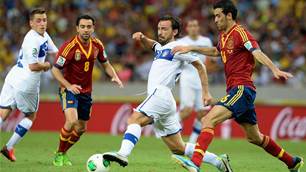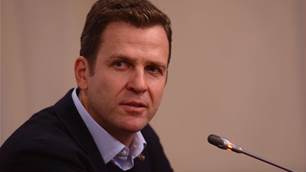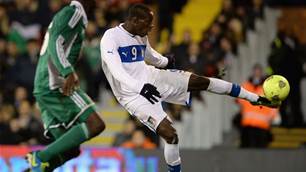As the World Cup draws ever closer, much of the global focus continues to be on hosts South Africa as a country - rather than its national football team.
For more than a year now, the country has been scrutinised over security, infrastructure and every other problem it may have had in the build-up, but a large part of the success of the tournament is certain to come down to the performance of the home team, the atmosphere of the nation and the excitement of its people.
In any major global event, this influence cannot be underestimated and 2010 will be no different.
The way the South Africa team has slipped under the radar, though, in recent months may not be a bad thing as they have struggled to make any real progress.
For a team that were winners and then finalists in the African Nations Cup in the mid-1990s, things have changed for 'Bafana Bafana' and they now head into the tournament ranked second-last among the qualified nations - as of May, they were 90th in the FIFA world rankings with only North Korea worse off at 106.
While development has been slow, there have also been several other factors that have affected the team over the past decade.
The chopping and changing of coaches has certainly not helped and neither has in-fighting in the South African Football Association (SAFA).
Bar Steven Pienaar, there are no longer many star players around - or even ordinary ones - making a real impact in Europe.
It all makes the reality for this year a bleak one - the country faces the real possibility of an early exit from the World Cup, something organisers and fans are becoming increasingly worried about.
Even the draw for the finals last December was unkind to them as they were pooled in Group A alongside former champions France and Uruguay as well as perennial second-round specialists, Mexico, who they face in the tournament opener in Johannesburg.
Coach Carlos Alberto Parreira, the country's 14th different manager in 18 years since apartheid ended, initially likened the group to "climbing Mount Everest", saying: "It's very clear, this is the toughest group, it is the only group with two former world champions.
"It is like a Mount Everest for us. And no one climbs Everest just by words. You need planning, commitment, passion, mental fitness and intelligence to conquer the mountain. We have to conquer Everest."
In Parreira, though, the hosts have a World Cup-winning coach following his 1994 exploits with his native Brazil and a man who will be taking his fifth team - he led his own nation twice (1994 and 2006), Kuwait (1982), the United Arab Emirates (1990) and Saudi Arabia (1998) - to the global spectacle.
This experience does not come overnight and South Africa will certainly be counting on it come June 11 at Soccer City.
Whether he can turn an average team into a competitive one remains to be seen.
Only midfielder Pienaar and defender Tsepo Masilela are playing and performing on a weekly basis for their clubs Everton and Maccabi Haifa, while the likes of Benni McCarthy, Bernard Parker, Aaron Mokoena and Kagiso Dikgacoi are getting very limited game time.
All these players are expected to be in the first XI when the World Cup kicks off and the problem is a growing one for Parreira.
"That will always be a concern," he says.
"It will make my job much easier if they were playing regularly. But I guess there isn't much I can do. We have to learn to work with what we have."
The coach has recently embarked on two key training camps with locally-based players, taking them on a month-long trip to Brazil followed by a shorter tour of Germany.
He is hopeful that this will help those selected in the final 23-man squad to become better players.
"What I can say is that everything has been going according to plan. I have assembled a squad of locally-based players for our camps, and this has yielded positive results," he added.
"The players know that they have a job to do.
"The most important thing is to concentrate on our priority, and that is to go beyond the group stages. We believe we can do this. You have to do things step by step. It's a process that involves patience and skill."
And the coach will be hoping that the expected matchday one crowd of 90,000 will spur them on to victory and draw the world's attention towards the on-field rather than the off-field action of South Africa.
In any major global event, this influence cannot be underestimated and 2010 will be no different.
The way the South Africa team has slipped under the radar, though, in recent months may not be a bad thing as they have struggled to make any real progress.
For a team that were winners and then finalists in the African Nations Cup in the mid-1990s, things have changed for 'Bafana Bafana' and they now head into the tournament ranked second-last among the qualified nations - as of May, they were 90th in the FIFA world rankings with only North Korea worse off at 106.
While development has been slow, there have also been several other factors that have affected the team over the past decade.
The chopping and changing of coaches has certainly not helped and neither has in-fighting in the South African Football Association (SAFA).
Bar Steven Pienaar, there are no longer many star players around - or even ordinary ones - making a real impact in Europe.
It all makes the reality for this year a bleak one - the country faces the real possibility of an early exit from the World Cup, something organisers and fans are becoming increasingly worried about.
Even the draw for the finals last December was unkind to them as they were pooled in Group A alongside former champions France and Uruguay as well as perennial second-round specialists, Mexico, who they face in the tournament opener in Johannesburg.
Coach Carlos Alberto Parreira, the country's 14th different manager in 18 years since apartheid ended, initially likened the group to "climbing Mount Everest", saying: "It's very clear, this is the toughest group, it is the only group with two former world champions.
"It is like a Mount Everest for us. And no one climbs Everest just by words. You need planning, commitment, passion, mental fitness and intelligence to conquer the mountain. We have to conquer Everest."
In Parreira, though, the hosts have a World Cup-winning coach following his 1994 exploits with his native Brazil and a man who will be taking his fifth team - he led his own nation twice (1994 and 2006), Kuwait (1982), the United Arab Emirates (1990) and Saudi Arabia (1998) - to the global spectacle.
This experience does not come overnight and South Africa will certainly be counting on it come June 11 at Soccer City.
Whether he can turn an average team into a competitive one remains to be seen.
Only midfielder Pienaar and defender Tsepo Masilela are playing and performing on a weekly basis for their clubs Everton and Maccabi Haifa, while the likes of Benni McCarthy, Bernard Parker, Aaron Mokoena and Kagiso Dikgacoi are getting very limited game time.
All these players are expected to be in the first XI when the World Cup kicks off and the problem is a growing one for Parreira.
"That will always be a concern," he says.
"It will make my job much easier if they were playing regularly. But I guess there isn't much I can do. We have to learn to work with what we have."
The coach has recently embarked on two key training camps with locally-based players, taking them on a month-long trip to Brazil followed by a shorter tour of Germany.
He is hopeful that this will help those selected in the final 23-man squad to become better players.
"What I can say is that everything has been going according to plan. I have assembled a squad of locally-based players for our camps, and this has yielded positive results," he added.
"The players know that they have a job to do.
"The most important thing is to concentrate on our priority, and that is to go beyond the group stages. We believe we can do this. You have to do things step by step. It's a process that involves patience and skill."
And the coach will be hoping that the expected matchday one crowd of 90,000 will spur them on to victory and draw the world's attention towards the on-field rather than the off-field action of South Africa.
Copyright (c) Press Association
Related Articles

Spain versus Italy to go ahead

Germany preparing for World Cup success













